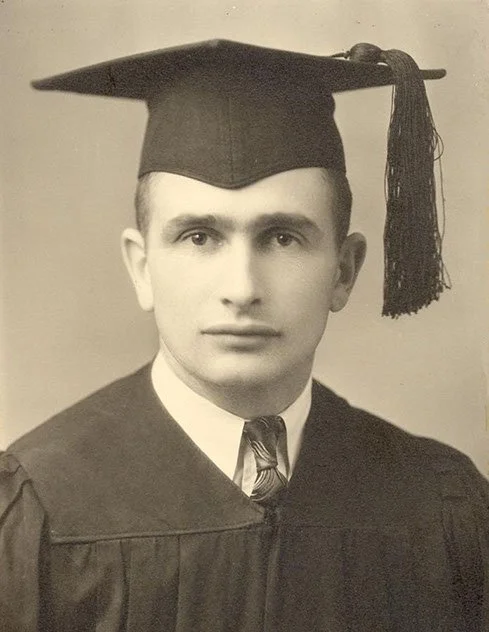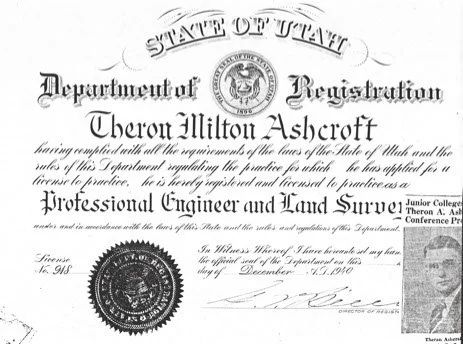Theron Milton Ashcroft
EDUCATION
“A good head and good heart are always a formidable combination. But when you add to that a literate tongue or pen, then you have something very special.”
― Nelson Mandela
“Education is what remains after one has forgotten what one has learned in school.”
― Albert Einstein.
~ Theron in graduation cap. ~
In 1933, Theron and Lucretia decided that the best thing for them would be for Theron to begin college at Utah State Agricultural College. Those were very difficult years for their young family, both financially and because Theron was gone so much, but they were committed. Supporting a family of six, as a student, was challenging. They would kill a milk cow every once in awhile when she got fat. They would try to sell it to a store or a butcher shop. When Anne was born the hospital accepted cows as payment of their hospital bill. When they couldn’t sell to a store or a butcher shop, they would try to sell to a family member. Lucretia had an uncle, Henry Hayball, who bought some and Oscar Cooley, at the college cafeteria, also bought some of them. Frequently on a Saturday, Theron would buy a nice fat cow for $20. He would kill it and dress it out. He would make fifty cents to a dollar for the hide and up to $4 profit for killing and selling her. That was good money in those days. Leland and Theron raised lots of potatoes over in Trenton. They dug them in the fall and stored them. In the winter, Theron would take a load to Logan on the sleigh. He sold them for twenty-five cents a sack. He had to deliver them upstairs, downstairs, and through narrow hallways, but he was still glad to sell them.
Another project they had was to go up into Idaho, to a place called Battlecreek, and buy fish - mullets. They bought them for three cents a piece. They would leave long before daylight to go and get them. Then they would drive back to Utah and sell them. Clarkston, Newton, and Mendon were good markets. They sold them three for a quarter. They would buy 300 each time they made a trip. Theron would usually hire a young boy to go with him and help sell. If they were able to sell the whole 300, they made really good wages, even after they had paid for the gas, the boy and everything. But if they had some left and they spoiled (for they wouldn't keep over night) then they didn't do so well. Theron never remembers actually losing money on the project, but they sometimes made very, very little.
A little later in the depression, the creamery stopped sending their skim milk back to them. Then Theron started going to the Agricultural College and buying it. He could buy it for five cents per ten-gallon can. He would take a little four-wheeled trailer behind his old ford and sometimes get as many as forty ten-gallon cans at a time. He would then go to a place where they were chopping grain to feed to cattle. There was no market for the grain. Theron would offer to clean out the room where the dust settled for them. He would get quite a few sacks of grain dust. He would feed pigs with the skim milk mixed with the grain dust. He remembers a man in Richmond who had quite a few pigs, a hundred head in fact. The Humane Society got after him because they were starving to death. Theron would buy a load of them at a time and fatten them to sell. Using the milk and the grain dust, there was very little cost to him to fatten them. He also did chores for David Hurren. He milked ten cows night and morning and fed them. He also cleaned out the stable and was paid $25 a month and a gallon of milk a day. That was most liberal and really helped Theron while he was in school.
After school and on Saturdays, Theron would work for A.W. Vail in his store. He would stock the shelves, help cut meat and anything else that needed doing. Eventually it got to the point where Mr. Vail would send Theron to Salt Lake on Saturday to buy for him. Theron would sometimes take advantage of theses trips to go into Z.C.M.I. and buy little things for his children.
At Utah State, Theron was closely associated with O. W. Israelson, worked for him and traveled with him extensively. He checked papers for a correspondence class that Dr. Israelson was teaching. Another job Theron had was with the scout organization. He thinks that he was paid by the W.P.A. but he taught classes to scoutmasters and prospective scoutmasters throughout Cache Valley.
He graduated from Utah State Agricultural College on June 5, 1937 with a Bachelor’s Degree in Engineering. He applied for and received a license from the State of Utah to practice as an Engineer and a Land Surveyor.
~ Graduation Diploma from Utah State Agricultural College in 1937. ~
~ Transcript of Credits. ~
~ Engineering License. ~
His first job was working for the Agricultural Adjustment Administration. They surveyed all of the farmland in Utah, irrigated or otherwise. Theron was assigned to be supervisor of the eleven southern counties, starting in Nephi. He had a survey crew in Iron County, one in Washington, six in Sanpete and eight in Sevier. He was supposed to visit them all once a month, twice a month if he could. When they offered him the job, they said that the pay would be $2000 per year and $4 a day per diem. He couldn't figure out what they meant or which of these he was going to get. He couldn't imagine anyone getting as much as both of them. It was a long time before he got a check from them and he and Lucretia ran out of money. They didn't know what they were going to do. They made arrangements to meet in Salt Lake one time when he had finished the rounds and they were sitting in the car discussing their sad plight when Aunt May Eldredge (Lucretia’s aunt -- her mother’s sister) walked down the street and saw them. She said that she had just sold a carload of wheat and she wondered if they would like to borrow $50. This Aunt May had a lot of money, and was a godsend to many members of the family in difficult times.
For this job with the Agricultural Adjustment Administration, Theron had to have a car. Dell Ashcroft was a car salesman in Logan and he had traded for a car in Richfield. He didn't know how to get it back to Logan, so he made arrangements for Theron to pick it up. Theron removed the back seat, had some braces cut out, and made a bed there so he didn't have to live in motels. That way he got by very inexpensively. It was a very good paying job, but the disadvantage was that he was gone from home all of the time. The evenings were so terribly long. The crews would quit work at 5 p.m. and it didn't get dark until 8 or 9 o'clock and Theron found it very lonely. So after a year, he quit that job and took one with the C.C.C. (Civilian Conservation Corp) in Price, Utah. That was also a good job. The C.C. boys waited on Theron hand and foot. He had one who drove his car, another who shined his shoes, etc., but it was also a lonely job, as he was still away from home. Theron had four children at this time and he felt he needed to be home. So when Henry Oberhansly called and said he wanted to talk to him about a teaching job he was delighted. He met him at the Eccles Hotel in Logan on Saturday. Oberhansly asked Theron how much he was getting and Theron said $2000/year. Oberhansly then asked him if he would come to the college in Cedar City for $2100/year and Theron jumped at the chance. The family moved to Cedar City on the 24th of July, 1939.
~ Cedar City and the beautiful Red Hill. ~





